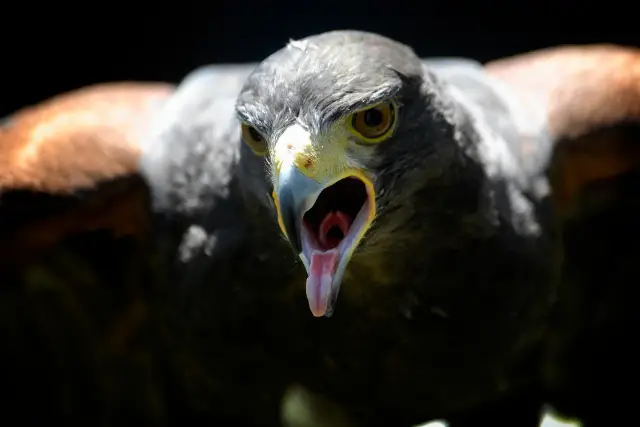Hawks are fascinating birds with powerful screeches that often catch our attention. Hawks screech for several reasons, such as to communicate, defend their territory, or signal danger.
These vocalizations serve important roles in their daily lives and interactions with other hawks. You'll discover that their sounds vary depending on what they need to convey.
Key Takeaways
- Hawks screech to communicate and defend their territory.
- Screeching helps signal danger or alert other hawks.
- Their vocalizations vary based on context and needs.
The Function of Screeching in Hawk Behavior

Hawks use screeching for communication related to territory, mating, and danger. The red-tailed hawk and red-shouldered hawk are commonly heard in these contexts. Their screeches serve functional purposes in various situations.
Territorial Communication and Defense
Hawks screech to mark and defend their territory. These vocalizations tell other hawks to stay away. If a hawk hears another hawk’s screech in its habitat, it might respond with its call or exhibit aggressive behavior. This helps maintain territorial boundaries.
During territorial disputes, hawks will use loud and persistent calls to assert dominance. Red-tailed hawks are known for their piercing cries, which can be heard from a great distance. This is crucial for keeping their hunting grounds and nesting sites safe from intruders.
Parents may also use specific calls to warn their young of encroaching threats or to recall them. The distinctiveness of these calls can indicate the nature of the danger and the urgency of their response.
Mating Calls and Reproductive Success
During the mating season, hawks use screeches to attract mates. These vocalizations can vary significantly depending on the species and individual hawk. Screeching plays a role in mating behavior and helps in identifying suitable partners.
Mating calls are often a mix of high-pitched notes, and these sounds can carry over large areas. They are particularly important in areas where trees or other obstacles might block visual signals. Effective vocal communication aids in locating mates and helps increase reproductive success.
Both male and female hawks participate in these calls, establishing bonds that lead to the selection of nesting sites. These vocal exchanges help in coordinating various stages of the mating and nesting process.
Alarm Signals and Predator Evasion
Hawks screech to signal danger. These alarm calls are essential for alerting others to nearby predators or threats. When a hawk gives a warning screech, it serves as an alarm signal to other birds of prey in the vicinity.
Different species of hawks may have distinct distress calls, but the aim is the same: rapid communication of potential danger. These screeches help other hawks, and sometimes even other animals, take cover or prepare to defend themselves.
Alarm screeches are crucial during times when hawks feel vulnerable, such as during the fledging period of their young. These calls enhance the chances of predator evasion and survival for both adults and chicks.
Understanding Hawk Vocalizations Across Contexts

Hawk vocalizations can vary widely and are influenced by species, environmental factors, and human activities. These sounds play a key role in different behaviors such as hunting, mating, and warning of danger.
Variations Among Different Species
Different species of hawks have unique vocal patterns. For example, the Broad-winged Hawk has a high-pitched whistle, while the Ferruginous Hawk produces more of a scream. A Sharp-shinned Hawk may emit short, sharp sounds. These calls can help you identify species by sound alone. Nest-spacing and hunting territories also influence the types of sounds they make, with different tones for different contexts like mating or defending territory.
Adaptations to Environmental Factors
Environmental factors shape the vocalizations of hawks. In dense forests, hawks screech with higher frequencies to carry through thick foliage. In open plains, lower tones might be more common. These sounds can change depending on the time of day; diurnal hawks adjust their calls during the day, while nocturnal species, like some owls, may have different vocal patterns at night.
The tone, frequency, and timing of their calls help in locating prey and avoiding predators, supporting their survival in various habitats.
Impact of Human Activities on Hawk Communication
Human activities like urban development, pesticide use, and pollution impact hawk communication. Pesticides can reduce the prey available, causing hawks to change their hunting calls.
Urban noise pollution disrupts their natural calls, leading to changes in frequency or volume. Human presence can also alter their nesting success, leading to quieter or less frequent calls to avoid attracting attention. Conservation efforts are crucial to safeguard these majestic birds and their habitats from further threats.
Frequently Asked Questions

Hawks are fascinating creatures, and their screeches often have specific meanings. You might wonder why they make these sounds and what to listen for.
What does it mean when you hear a hawk screeching?
Hawks screech to communicate with others. When you hear a hawk screech, it might be defending its territory. They could also be signaling danger or locating their mate.
Are hawks known to use screeches as a form of communication?
Yes, hawks use screeches to communicate. These calls can convey different messages. They help hawks stay connected with family members and warn of nearby threats.
How can you interpret the different screeches made by hawks?
You can interpret hawk screeches by paying attention to the context. Short, sharp screeches might indicate a warning. Longer, more rhythmic calls could be about mating or territory. Listening to the patterns and timing will provide more clues.

